Obituary: Jimmy Young
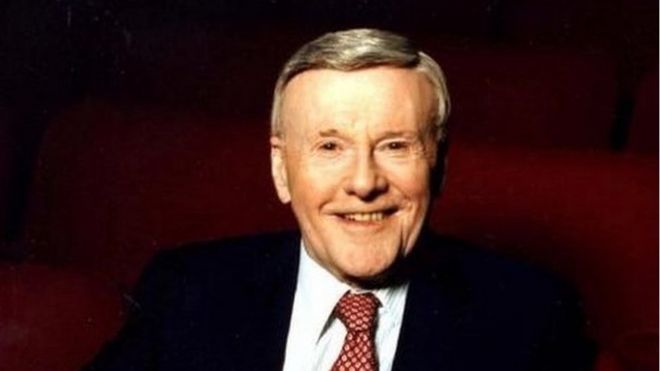
For more than six decades, Jimmy Young was a key figure in British broadcasting.
The one-time crooner, who had a string of hit singles in the 1950s, went on to become one of radio's best loved presenters.
During his career, a veritable who's who of royalty, politicians and celebrities subjected themselves to his gentle yet probing style of interview.
His acrimonious departure from the BBC in 2002 led to a storm of protest, including questions in parliament.
He was born Leslie Ronald Young in Cinderford, Gloucestershire on 21 September 1921.
He was keen on music from an early age and learned to play the piano as well as having professional voice training.
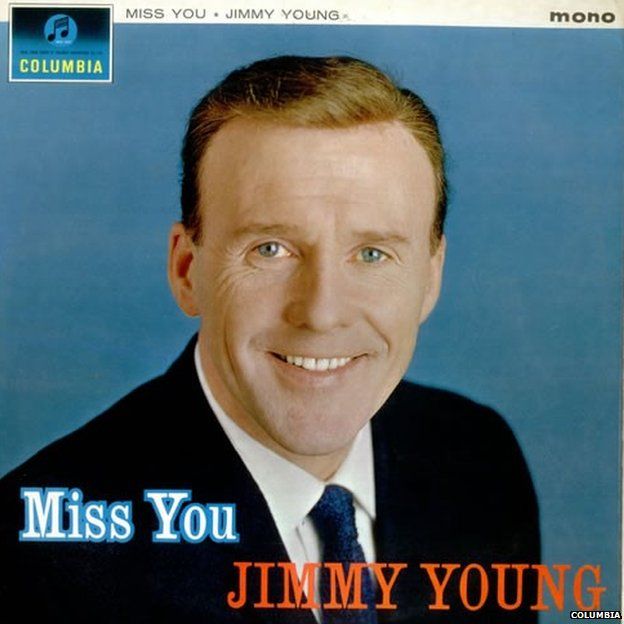 COLUMBIA
COLUMBIA
His parents divorced in 1939 and Young moved to South Wales. He signed up with the RAF on the outbreak of war after falsely giving his age as 18. He was, in fact, three weeks short of his 18th birthday.
Shortly after he was demobbed in 1949, he was spotted singing in a club by a BBC producer and went on to make a number of broadcast appearances as well as touring across the UK.
His first release, a cover of the Nat King Cole song, Too Young, was a huge hit just a year before the UK Singles Chart was born.
He signed to Decca in 1952 and enjoyed a number of Top 10 hits. He was also asked to perform some of the songs in Gene Kelly's film, Invitation to the Dance.
Easy listening
But, by the end of the 1950s rock and roll was the new craze and crooners like Young suddenly found themselves out of fashion.
His income plummeted, he sank into depression and turned to drink to ease the pain. He later confessed that he had contemplated suicide.
In desperation he visited a fortune teller who informed him he was going to be a great success. He picked himself up and went back into radio.
After hosting a show called A Young Man's Fancy on Radio Luxembourg he moved to the BBC Light Programme.
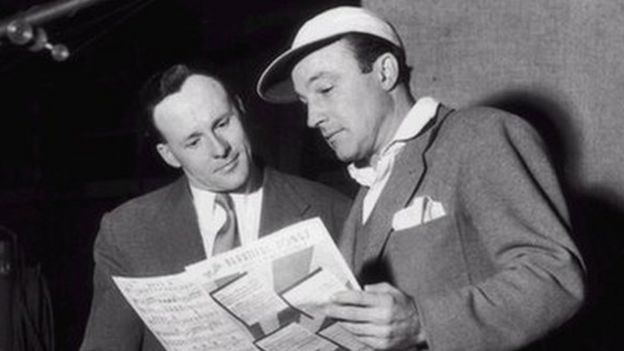 GETTY IMAGES
GETTY IMAGES
He became one of the hosts of Housewives' Choice, playing easy listening music while outside in the real world the Beatles and Rolling Stones fought for chart supremacy.
Five years after the Beatles' first hit single the BBC finally launched Radio 1, a station devoted to pop music, to fill the gap left by the closure of the pirate radio stations.
While many of the new station's young DJs were ex-pirate presenters, Young, by then 46, became part of the line-up.
A lack of money meant some output was broadcast across both Radio 1 and Radio 2, as the old Light Programme was now called, and Young presented the mid-morning show.
Experts
In contrast to the brash style of the Breakfast Show, presented by Tony Blackburn, Young's programme was much more sedate in tone.
It included regular consumer information, recipes and discussions on current affairs.
In 1973, the BBC revamped its music stations and Young's show was heard solely on Radio 2.
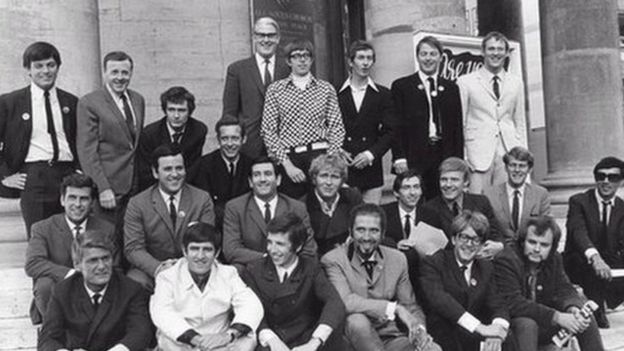
Over the next 30 years, the format remained much the same with experts, such as Tony di Angeli from the Grocer magazine and "Legal Beagle" Bill Thomas dealing with listeners' queries.
His shows were peppered with catchphrases such as "BFN" and "Orf we jolly well go", as well as the squeaky voice of Raymondo with his, "What's the recipe today Jim?"
During his tenure he interviewed every prime minister as well as members of royalty and other celebrities.
Margaret Thatcher appeared on the show 14 times and declared Young was her favourite presenter.
Ousted
His interviewing style was probing but gentle, something the Labour politician Roy Hattersley described as "courtesy with a cutting edge".
His detractors claimed he was too soft with politicians, something that Young always strongly denied.
"You catch more flies with honey than vinegar," he once said. "I hold conversations. I am a listener."
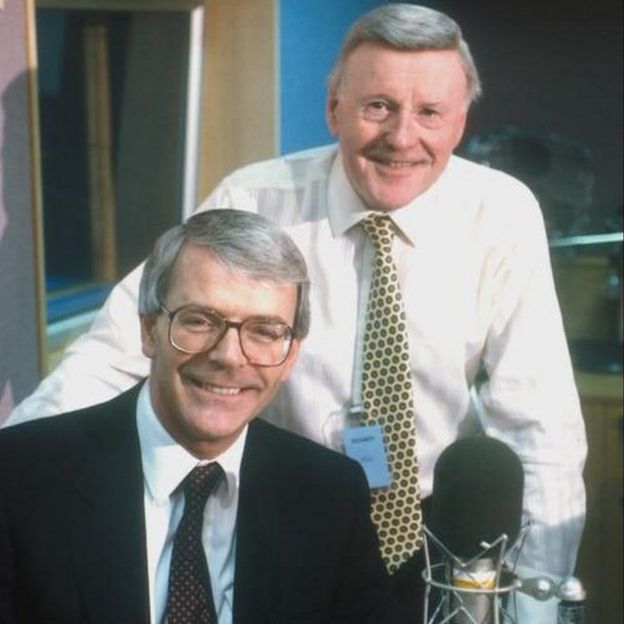
By the turn of the century, Young was in his 80s and BBC management was desperate to attract a younger audience to Radio 2.
The new controller, Jim Moir had already ousted Ed Stewart and John Dunn and he now turned his attention to the Jimmy Young programme.
When news that he was to be replaced leaked out, Young, who by now had collected a knighthood, hit back with a well-organised PR campaign.
He gained huge support from listeners and a diverse range of well-known figures. An Early Day motion was put down in Parliament calling on the BBC to keep him on.
Ire
Young himself was not going quietly. Saying that he was flattered that so many people wanted his job he went on to make clear he had no plans to leave.
"Unless, of course, in the ageist pursuit of youth someone decides to ignore my record-breaking ratings and fire me."
Eventually after much bitter wrangling it was announced that Young would be relinquishing his morning show to Jeremy Vine.
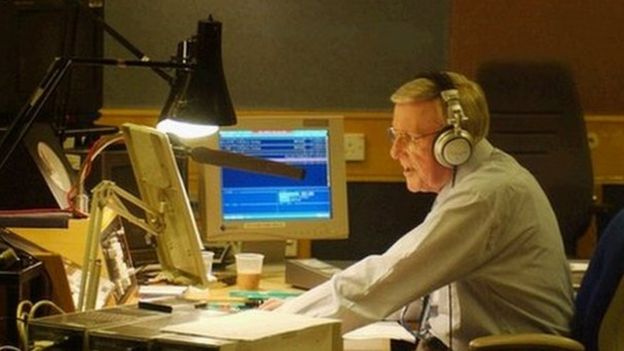
"Just so that we're all singing from the same hymn book, it was not my idea to go - I didn't want to leave you at all and I know from your messages that you don't want me to go either."
Young was asked to present a weekly show on Sundays but he turned the offer down venting his ire at the BBC's decision in a newspaper article.
The hatchet was eventually buried and in 2011, Young was back behind a microphone in a special programme to mark his 90th birthday.
While Radio 2 went through many changes during Young's tenure, his show remained much as it had begun and one of the station's flagship programmes.
Jeremy Vine, the man who took over Jimmy Young's show, once summed up his appeal.
"Jimmy was just a totally ordinary, honest bloke, the least pretentious person you could ever imagine. And his audience adored him for it."
No comments:
Post a Comment